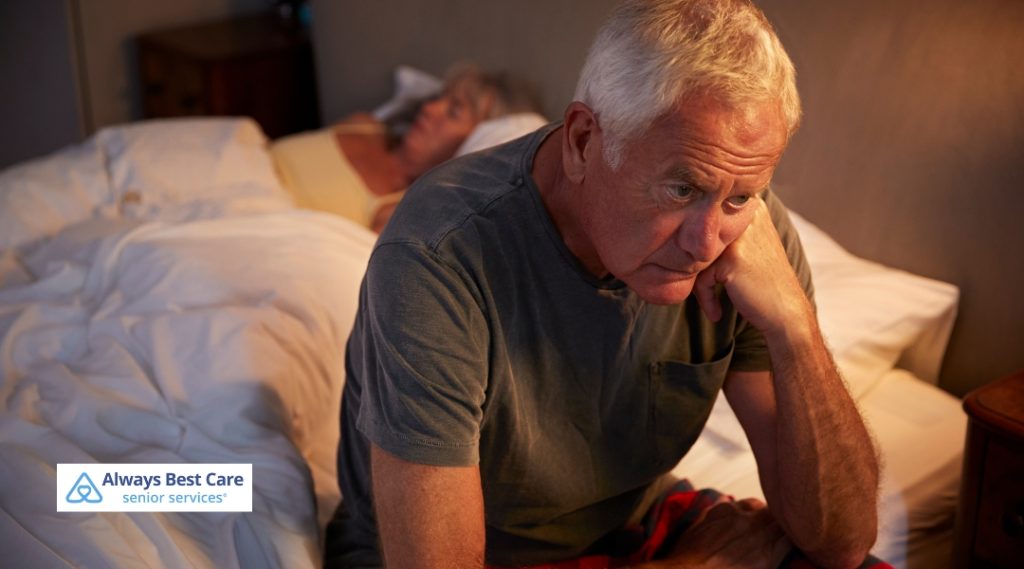Overcoming Sleep Struggles: Senior Tips for Better Sleep in NW Chicago, IL

If you’re a senior in NW Chicago, IL, and are finding it hard to sleep through the night, you’re not alone.
Sleep struggles are a common issue for many seniors, and while it can be frustrating, there are ways to overcome it.
Poor sleep not only leaves you feeling tired and irritable but also affects your overall health.
The good news?
With a few tweaks to your routine, your environment, and even your lifestyle, you can say goodbye to sleepless nights and wake up feeling refreshed. Let’s explore how to tackle insomnia and sleep soundly once more.
Table of Contents
Why Do Old People Sleep So Much?
If you’ve ever asked, “Why do old people sleep so much?” you’re not alone.
It’s true that seniors tend to sleep longer, but the reality is that it’s not always the restful, deep sleep they need. Instead, seniors often spend more time in lighter stages of sleep, which makes it easier to wake up throughout the night. That might make it seem like you’re sleeping more, but it’s actually the quality of sleep that decreases.
Why Do Seniors Struggle with Sleep?
As we get older, our sleep patterns often change.
You might wake up more frequently during the night, unable to fall back asleep, or simply feeling like you’re not getting restful sleep. This isn’t just about getting older—it’s about how our bodies evolve over time. For seniors, there’s a mix of factors that contribute to sleep struggles.
For starters, our bodies produce less melatonin, the hormone that helps regulate our sleep cycles. Additionally, many seniors face medical issues like arthritis, sleep apnea, or even chronic pain, all of which can make it tough to get a good night’s rest.

Tips for Improving Sleep Quality for Seniors in NW Chicago, IL
- Stick to a Sleep Schedule: Try to go to bed and wake up at the same time every day. Even on weekends, keeping a regular schedule helps set your internal clock, making it easier to fall asleep and wake up naturally. This consistency can improve your overall sleep quality.
- Create a Relaxing Bedtime Routine: If you’ve had a busy day or are dealing with stress, it can be hard to unwind. Create a calming bedtime ritual that helps signal to your body that it’s time to sleep. You might try reading, listening to soothing music, or practicing deep breathing exercises. This will help ease anxiety and prepare you for a more restful night.
- Limit Stimulants Before Bed: Avoid caffeine and alcohol in the evening, as both can interfere with your sleep. While alcohol might make you feel sleepy initially, it disrupts your sleep cycle, leading to a restless night. Caffeine, on the other hand, can stay in your system for hours, making it harder to fall asleep.
- Optimize Your Bedroom Environment: Make your bedroom a sleep-friendly space. Keep the room cool, dark, and quiet. Consider using blackout curtains if light is a problem, and invest in a comfortable mattress and pillows. A sleep-friendly environment plays a big role in getting quality rest.
- Exercise During the Day: Regular physical activity can help you fall asleep faster and enjoy deeper sleep. Try activities like walking, swimming, or stretching—anything that gets your body moving. Just avoid vigorous exercise right before bedtime, as it may leave you feeling too energized to relax.
When to Seek Professional Help for Insomnia
If you’ve tried everything and still find yourself tossing and turning, it may be time to talk to a healthcare professional.
Chronic insomnia could be a sign of an underlying issue, such as sleep apnea, restless leg syndrome, or depression.
Your doctor can help determine the cause of your sleep problems and recommend treatments like cognitive behavioral therapy (CBT-I) or sleep studies.

FAQ: Senior Sleep and Insomnia in NW Chicago, IL
Why do I wake up so often during the night?
As we age, our sleep becomes lighter, and we spend less time in deep sleep. This causes us to wake up more frequently. Certain health issues or medications may also contribute to disrupted sleep.
Can exercise help improve my sleep?
Yes! Regular physical activity promotes better sleep by helping to regulate your sleep cycle. Aim for moderate exercise during the day, but avoid intense workouts right before bed.
What can I do if I wake up in the middle of the night?
If you wake up and can’t fall back asleep, try not to look at the clock. Instead, focus on relaxing by deep breathing or reading. Avoid checking your phone as the blue light can further disrupt your sleep.
Restful Nights Await in NW Chicago!
If you or a loved one are struggling with insomnia and need extra support, we are here to help. Contact Always Best Care of Northwest Chicago at (312) 465-6833 to schedule a care consultation and learn how our in-home care services can improve your quality of life. A restful night’s sleep is just a call away.





